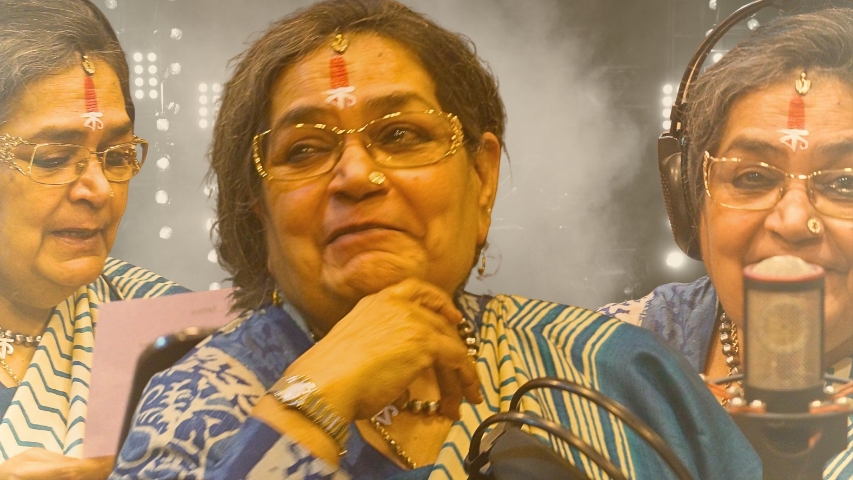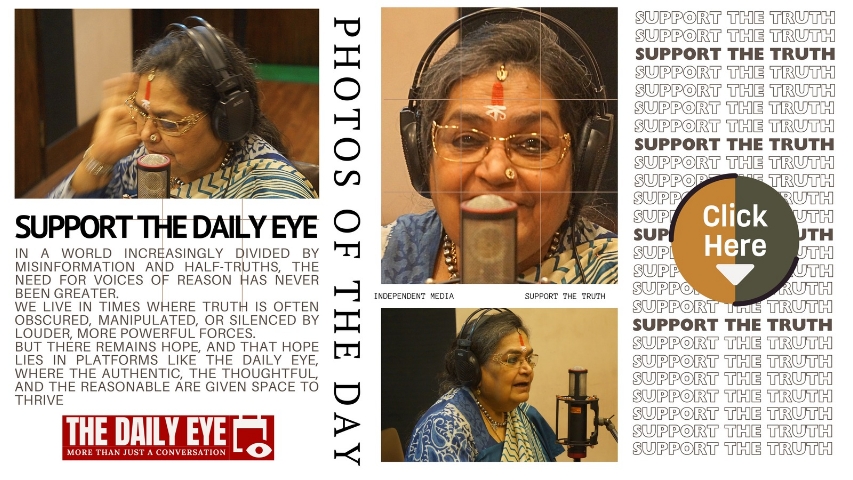
POWERFUL PEOPLE: USHA UTHUP - THE QUEEN OF POP
by Vinta Nanda November 21 2024, 12:00 am Estimated Reading Time: 3 mins, 45 secsCelebrating Usha Uthup’s five-decade journey as a musical trailblazer, cultural ambassador, and symbol of empowerment, bridging Indian and global music traditions. Vinta Nanda writes…
Photography: Vinta Nanda
These pictures of Usha Uthup were shot during the recording session of #SHOUT in Kolkata. They serve as a tribute to her unparalleled journey and impact on the Indian music industry.
Usha Uthup, India's queen of pop, has enthralled audiences worldwide for over five decades. Known for her deep voice, multilingual repertoire, and signature sari-clad style, she has seamlessly bridged Indian and Western music. Usha’s Bollywood hits, global performances, and advocacy for social causes make her an irreplaceable icon. Whether through chart-topping tracks like “Hari Om Hari” or her role as a cultural ambassador, Usha continues to inspire with her indomitable spirit.
A Voice Like No Other
From humble beginnings to becoming India's queen of pop, Usha Uthup’s journey reflects an undying passion for music and her incredible ability to blend global and Indian influences seamlessly. Known for her signature deep voice, traditional sari-clad appearance, and infectious charm, Uthup has carved an irreplaceable niche in the Indian music industry.
In 2023, I had the privilege of meeting her in Kolkata for the recording of a song for my film #SHOUT. The music, composed by Raja Narayan Deb, needed a voice that could carry the essence of feminism and liberation. For me, growing up in the 1970s and 80s, Usha Uthup was a woman icon—an embodiment of emancipation and a role model for every girl who dared to dream beyond societal norms. It was non-negotiable that she would sing the lead song of a film that chronicles feminism in India, its evolution, and the #MeToo movement.
Recording with her was a surreal experience, as I stood in awe of the artist I had admired for decades. Her energy, warmth, and sheer talent turned the day into an unforgettable moment. I, of course, was a fangirl, capturing memories in photos that I hold dear as a tribute to her timeless influence.

Beginnings in Mumbai
Born on November 8, 1947, in Mumbai to a Tamil Brahmin family, Usha grew up in a household that nurtured a love for the arts. Her exposure to Western pop music during her school years at St. Agnes High School planted the seeds of her musical career. Despite no formal training in music, her rich, resonant voice set her apart.
Her journey began serendipitously when she performed at Nine Gems, a small nightclub in Chennai, during the late 1960s. Her natural charisma and talent caught the attention of audiences and promoters alike. By the time she became a regular performer at Trincas in Kolkata, Usha Uthup was already on the path to stardom. Singing covers of Western hits, she mesmerized audiences with her unique style, paving the way for a remarkable career.
Bridging the East and West
In 1969, Usha recorded her first single, blending Western pop with Indian instruments—a style that would become her hallmark. She defied the norms of playback singing by bringing a contemporary edge to the Indian music industry.
Her Bollywood breakthrough came with the song “Hare Rama Hare Krishna” in the 1971 film Hare Rama Hare Krishna. Uthup’s unconventional voice brought an international flair to iconic tracks like "Rambha Ho Ho Ho" (Armaan), "Hari Om Hari" (Pyaara Dushman), and "Koi Yahan Nache Nache" (Disco Dancer). These hits established her as a powerhouse in Indian cinema’s golden era.
India’s Cultural Ambassador
Usha Uthup's versatility extends beyond Bollywood. Singing in over 17 languages, she has performed for diverse audiences across India and the world, from Kolkata to Kenya and London to New York. Her multilingual repertoire and vibrant stage presence made her India’s cultural ambassador, representing the country’s diversity on global platforms like the Royal Albert Hall and Lincoln Center.
Even as she approaches her eighties, Usha Uthup continues to be a force in the music world. She collaborates with young artists, mentors upcoming talent, and performs for packed audiences. Her autobiography, The Queen of Indian Pop: The Authorised Biography of Usha Uthup, co-authored by Vikas Kumar Jha, offers readers an intimate look into her extraordinary journey.
For anyone who grew up during the 1970s and 80s, Usha Uthup represents more than music—she symbolizes emancipation and liberation. Her voice, spirit, and artistry remain unmatched, ensuring her legacy as a cultural icon for generations to come.





-173X130.jpg)
-173X130.jpg)
-173X130.jpg)


-173X130.jpg)
-173X130.jpg)
-173X130.jpg)